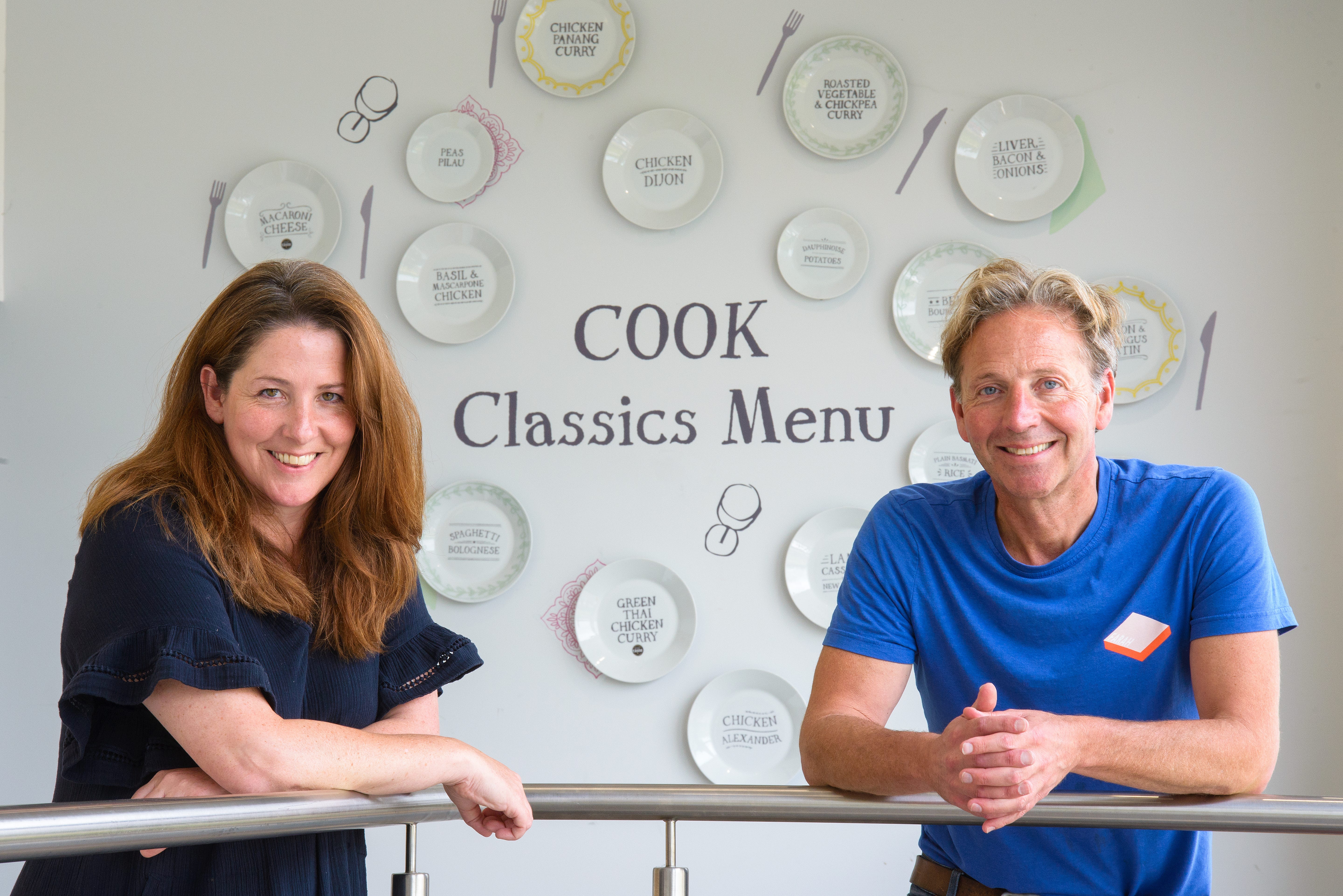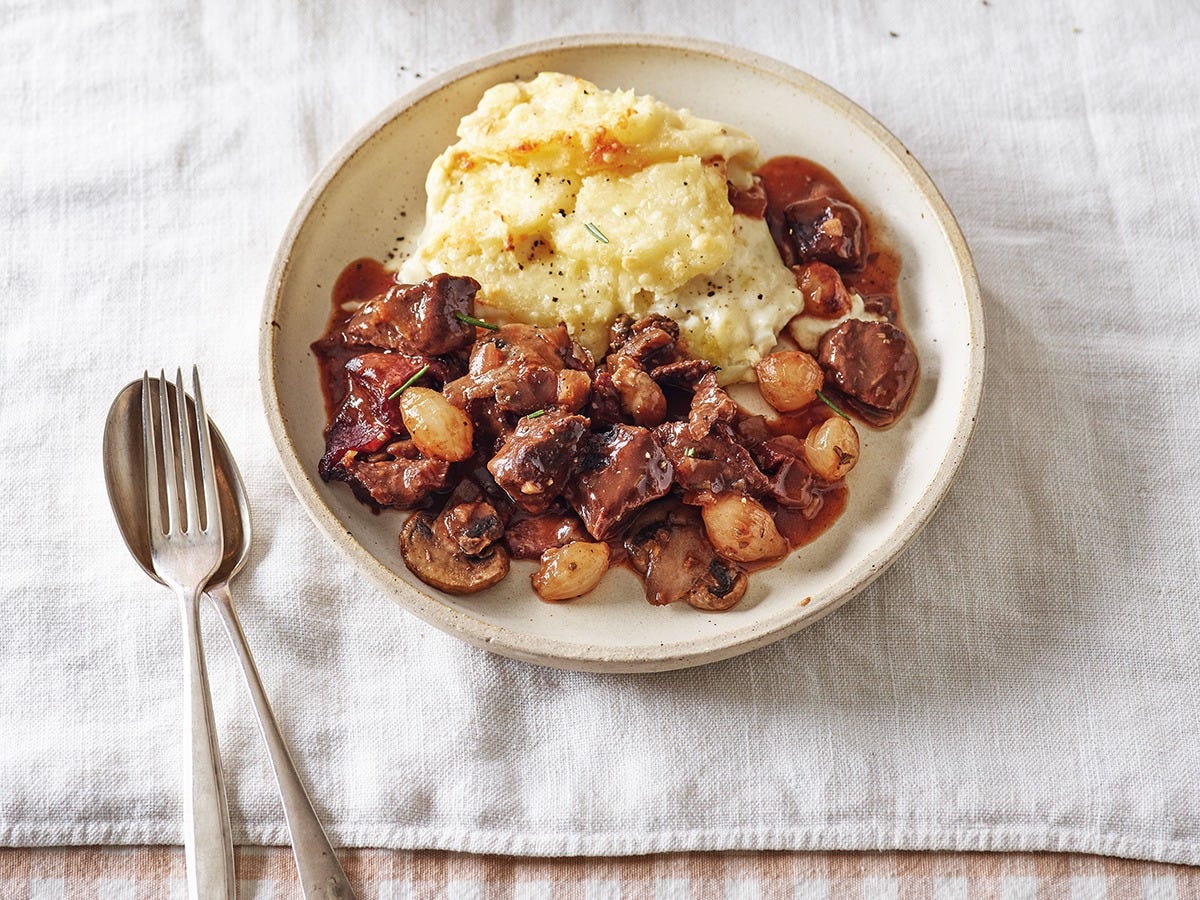“Culture's never an accident”
What we asked Ed Perry and Rosie Brown, the brother and sister co-CEO's of COOK.
COOK is an award-winning food manufacturer and retailer. Steven met the brother and sister co-CEOs, Ed Perry and Rosie Brown, at the company’s Sittingbourne headquarters. They discussed how they both came to be at COOK, taking action to protect people and the planet, and why the magnificent turkey laab dish is at risk.
What is your official occupation?
Ed: I am the co-CEO of COOK.
Rosie: Ditto.
How would you describe COOK?
Ed: Frozen food that looks and tastes homemade. Our founding statement was to use the same ingredients and techniques that a good cook would use at home, so everything looks and tastes homemade. That founding principle still holds true. Essentially, when somebody doesn’t have the time, energy or inclination to cook for themselves, whether it be a meal for one, a meal for two, or inviting friends or family over dinner, we will have something that can help.
And how would you describe COOK from a non-food point of view?
Rosie: I think COOK is a business that cares very deeply for people and planet. I think from a non-food point of view, we're very interested in culture being a good workplace. We're very interested in helping feed the vulnerable people in our communities, and we're very interested in food and where it comes from and supporting British farmers and farmers who are looking after the environment.
How did you come to be involved with COOK?
Ed: I was working as a salesman for my parents’ bakery business. They made wonderful cakes and tray bakes that looked and tasted homemade, which were sold frozen to coffee shops and caterers in the south of England. We got brought up with our mother cooking from the freezer. She would make a batch of chili con carne or chicken casserole, some of which we would eat and the balance of which she would put in old ice cream tubs in our big chest freezer at home and then on a Tuesday night she'll take out the ice cream tub, put it in the microwave and we'll eat it and it would always be delicious.
It was in my early 20s, whilst I was working as a salesman, I thought, the cakes and the puddings, they look and taste so different from what you can buy in the supermarket. If we could make savoury food that is similar in principle to the cakes and puddings they were already making, then potentially it could be a retail concept that could work on the high streets. I had this bubbling away in the back of my head, and the only problem I had was that I'm not a chef. I didn't know how I'd actually go about making this food, and the only chef I ever spoke to about it was Dale Penfold, who was head chef at the Whitbread Hop Farm. He was a customer of mine, and I would go and see him every three months or four months to see if he would carry on buying the cakes from my parents' bakery. Whilst I was there on a sales call, I talked to him about this idea I had to make savoury food that looked and tasted homemade but was sold frozen. Eventually, back in 1996, I said to him, ‘I'm going to do this. Will you come and do it with me?’
Happily, it coincided with him falling out with his boss, and I remember him saying to me, ‘Look, I've got four kids. I'll come and do it with you. You just need to pay me what I’m being paid at the Hop Farm, and I'll come and do it.’ I said, ‘I'll commit to that.’ That's how it basically got started. We borrowed a little bit of money off NatWest, and our parents lent us about six grand as well. We had a total budget of about 30 grand, and Dale had a budget to set up the first kitchen, which, even 26 years ago or 27 years ago, was a crazily small amount of money to get a commercial kitchen up and going. But because he's just extraordinary, he managed to do that. Bought a bunch of old second-hand equipment, found an old pizza delivery unit in Rainham that was condemned, and the landlord said, ‘Well, you can have it for 50 quid a week, but I could give you six months’ notice at any moment, and you're going to have to go, because McDonald's are going to build here.’ But we thought, ‘We'll take a punt on it.’
Rosie: My other brother James called me. Ed and James were both working in the business, and they called me in 2000 when COOK was three years old and said, ‘Why don't you come and join us?’ I said, ‘I have no idea about running a business,’ and they said, ‘Well, neither do we. We're trying to figure it out as we go.’ So that was that.
Neither of you are chefs, so what was your involvement in those early days?
Ed: I was very much in the shops. The first three years, I was in the shop the whole time. I was very, very much running the sales front end of the business. I suppose I had a clear idea of the sort of product I wanted to sell. I'm a salesman. I would essentially give Dale, who was a chef, a brief of the sort of product I wanted, and then Dale would go and create it. I was sales and product creation.
We had not the first idea about conventional food shortcuts that you can make. I think the fact that our ignorance protected us from possible shortcuts that could be made.
Do you remember what the first meal was that came where you thought, ‘This is going to work?’
Ed: Well, I remember the first meal I ever tried that he made. It was about three weeks before we opened the first shop. It was a lentil and fennel bake. I was living in a small flat in Clapham at the time when I got this thing, and I was so excited. It was our first meal. I remember thinking at the time, ‘Lentil and fennel bake, I'm not sure…’ I pulled it out of the oven, and it was completely inedible in every way. Up until that moment, I'm a very glass half full type person, I just assumed Dale would be able to produce the sort of food my mother used to produce, and it would just happen. It was in that moment where I realised this is going to be really hard, because if it was easy, other people would have done it. You couldn't buy anything like this in the supermarket. You can't now, really. That was the moment I thought this is going to be really hard.
But that was the first thing. The second thing was more successful, which was a beef bourguignon, which was okay. It wasn't nice, but at least it was okay. The first three years was really about Dale testing and learning, changing recipes, tweaking everything as he went along to get to a point in about 2000 where we had a menu where we could go, ‘That's pretty good.’ But it took a long time. That's still where easily the biggest challenge in the business is. It's about making the food taste good every single time.
Rosie: I initially stayed on the cake company side, and I did HR, traditional transactional HR, hiring and firing. They had about 80, 100 employees at the time, and then eventually I moved over to the COOK side. I remember setting up the first customer care team, answering all the emails. I did that for a bit, but I always came back to people. I've done most departments in HQ at some point or another. I came back from maternity leave in about 2010 and became People Director. That's when we really started to work on our culture intentionally.
Keep reading with a 7-day free trial
Subscribe to Kent Current to keep reading this post and get 7 days of free access to the full post archives.




